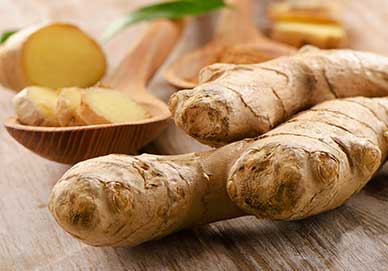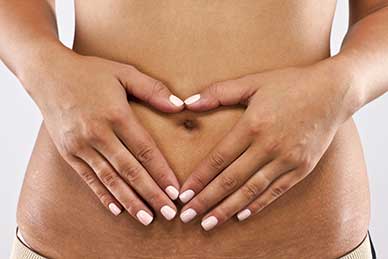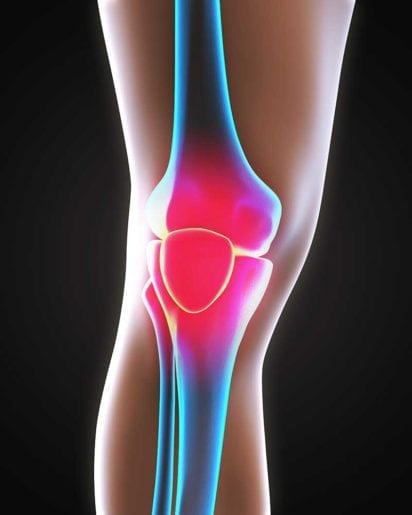Americans spend billions of dollars a year on pharmaceuticals. Despite this, we are somehow among the sickest people in the developed world, with high incidences of cancer and other life-threatening diseases. Many people are looking for ways to stay healthier and avoid the devastation of disease. Scientists have long blamed the high fat and sugar content of our diet for much of our collective poor health, but another aspect of the Western diet may also contribute: A lack of spice. New studies on various spices are showing that benefits of capsaicin and ginger include helping to promote healthy cell growth and lowering your chance of developing certain diseases.
The Importance of Cellular Health
Our bodies rely on cell growth to sustain our tissues and ultimately to stay alive. Because it is important that cells grow when needed—and only then—there are a variety of checkpoints involved in starting and stopping cell growth and reproduction. When these systems break down, there are two main results: Either tissues cannot produce new cells, or they reproduce out of control. When cells grow and reproduce without essential checkpoints, the result is cancer.
Cancer is ultimately an end-product of unhealthy cell growth and reproduction. Cells grow out of control, crowding out healthy cells. When cancer metastasizes, the cells from this tumor invade other tissues. In addition to crowding out normal cells, cancerous cells also require a great deal of energy to maintain this constant growth, leeching energy and nutrients from other tissues in the body. You can see why maintaining healthy cell growth is essential as you age. Capsaicin, ginger and other spices may contribute to promoting this healthy cell growth.
Capsaicin: Promoting Healthy Cell Growth
 Capsaicin, the molecule that makes chili peppers spicy, appears to have a variety of benefits in sustaining healthy cell growth. When this compound is added to petri dishes containing cells from the most difficult-to-treat type of breast cancer, a new cell receptor is switched into action. This ultimately leads to the slowing of tumor growth and even the death of some of the unhealthy cells. Unhealthy cell growth in the breast is not the only type that appears to respond to capsaicin. Gut tumors also appear to respond to capsaicin in the same way. Capsaicin isn’t the only spice that appears to have powerful benefits for promoting healthy cell growth. Together, certain compounds in ginger and capsaicin were shown to be particularly effective in helping to maintain healthy cell growth.
Capsaicin, the molecule that makes chili peppers spicy, appears to have a variety of benefits in sustaining healthy cell growth. When this compound is added to petri dishes containing cells from the most difficult-to-treat type of breast cancer, a new cell receptor is switched into action. This ultimately leads to the slowing of tumor growth and even the death of some of the unhealthy cells. Unhealthy cell growth in the breast is not the only type that appears to respond to capsaicin. Gut tumors also appear to respond to capsaicin in the same way. Capsaicin isn’t the only spice that appears to have powerful benefits for promoting healthy cell growth. Together, certain compounds in ginger and capsaicin were shown to be particularly effective in helping to maintain healthy cell growth.
Whole Health Benefits of Capsaicin
Capsaicin appears to have the potential for maintaining healthy cells, but there may be other reasons to spice it up. The health benefits of ginger, capsaicin and other spices appear to extend far beyond cellular health. Scientists tracked the diets of a large population over almost two decades as well as their rates of death. People who eat larger-than-average amounts of capsaicin and ginger were found to have a 13 percent lower rate of death from all causes. It appears that the promotion of healthy cell growth may be a factor in preventing a wide variety of health concerns, although the actual mechanism is not currently known.
This is great news for people who enjoy eating spicy food, but not so much for those with more timid palates. Is there a way to get the benefits of capsaicin and ginger without burning a delicate tongue?
Not a Fan of Spice? Ways to Get the Benefits of Capsaicin and Ginger
 If you wish to get more capsaicin and ginger in your diet for the health effects of these spices, there are a variety of options. Ginger is a common spice used in Asian foods as well as those from a variety of places. However, if you do not appreciate a spicy curry, ginger is also used in a wide range of traditional Western desserts such as gingerbread. Capsaicin can be more difficult for picky eaters to incorporate into their diets. It is present mainly in hot peppers such as jalapenos and habaneros, giving these peppers their heat and bite.
If you wish to get more capsaicin and ginger in your diet for the health effects of these spices, there are a variety of options. Ginger is a common spice used in Asian foods as well as those from a variety of places. However, if you do not appreciate a spicy curry, ginger is also used in a wide range of traditional Western desserts such as gingerbread. Capsaicin can be more difficult for picky eaters to incorporate into their diets. It is present mainly in hot peppers such as jalapenos and habaneros, giving these peppers their heat and bite.
If you cannot handle the taste of capsaicin or ginger enough to add it in therapeutic amounts to your diet, there are also supplements that contain ginger and capsaicin. Because these pills or capsules are swallowed whole, you do not have to burn your tongue to get the benefits of these spices. This may be the best option for Americans and other places in the West, where spicy foods are a taste that many simply do not acquire.
Diet is one of the foundations of good health. While we often focus largely on things we should not eat, such as white sugar and saturated fat, it is just as important to add healthy nutrients and compounds to our daily life. Capsaicin and ginger appear to play an important role in promoting healthy cell growth and thus good whole-body health, so even the pickiest eater has good reason to get a little more spice in their life.
 According to several recent studies, taking resveratrol may make it easier for couples to conceive a child. Women are born with all of their eggs present in ovaries and waiting for more fertile times. As women age, their eggs also age and decrease in general quality. Even if older couples try in-vitro fertilization and other reproductive technologies, low-quality eggs can be a major barrier to conceiving and bearing a healthy child. However, there is hope. Mice that were given resveratrol throughout their fertile years had
According to several recent studies, taking resveratrol may make it easier for couples to conceive a child. Women are born with all of their eggs present in ovaries and waiting for more fertile times. As women age, their eggs also age and decrease in general quality. Even if older couples try in-vitro fertilization and other reproductive technologies, low-quality eggs can be a major barrier to conceiving and bearing a healthy child. However, there is hope. Mice that were given resveratrol throughout their fertile years had  Red wine has long been touted as one way to get resveratrol. However, there is some controversy as to whether the amounts of resveratrol in red wine are sufficient; also, this may not be a solution for women who are trying to conceive and are thus avoiding alcohol. If you are interested in trying this supplement because of the link between resveratrol and fertility, there are other ways to get your daily allowance. Berries such as blueberries and mulberries are both good sources of this compound. In addition, it is present in large amounts in the skins of red grapes, so eating this fruit may help.
Red wine has long been touted as one way to get resveratrol. However, there is some controversy as to whether the amounts of resveratrol in red wine are sufficient; also, this may not be a solution for women who are trying to conceive and are thus avoiding alcohol. If you are interested in trying this supplement because of the link between resveratrol and fertility, there are other ways to get your daily allowance. Berries such as blueberries and mulberries are both good sources of this compound. In addition, it is present in large amounts in the skins of red grapes, so eating this fruit may help. Some people keep their mental faculties throughout old age, while others succumb to Parkinson Disease, Alzheimer’s disease and other devastating types of dementia. Most elderly people end up somewhere between these two extremes, with a condition known as
Some people keep their mental faculties throughout old age, while others succumb to Parkinson Disease, Alzheimer’s disease and other devastating types of dementia. Most elderly people end up somewhere between these two extremes, with a condition known as  If you are concerned about lutein and brain health, there are a few ways to ensure that you get enough of this vital nutrient. First, eat several servings a day of foods rich in lutein, which include:
If you are concerned about lutein and brain health, there are a few ways to ensure that you get enough of this vital nutrient. First, eat several servings a day of foods rich in lutein, which include: Celecoxib, a non-opiate anti-inflammatory pain medication, is the current preferred treatment for joint conditions such as osteoarthritis. Celecoxib reduces pain from inflammation of joints while slowing the joint destruction that can occur over time. However, even this first-line treatment does not always affect pain or slow joint damage. This medication is only effective in some patients, and even then it merely serves as a “Band-Aid” rather than helping to promote ongoing joint health. In addition, it can have serious side effects such as permanent liver damage. As a result, many people seek a natural option that can help soothe minor joint discomfort.
Celecoxib, a non-opiate anti-inflammatory pain medication, is the current preferred treatment for joint conditions such as osteoarthritis. Celecoxib reduces pain from inflammation of joints while slowing the joint destruction that can occur over time. However, even this first-line treatment does not always affect pain or slow joint damage. This medication is only effective in some patients, and even then it merely serves as a “Band-Aid” rather than helping to promote ongoing joint health. In addition, it can have serious side effects such as permanent liver damage. As a result, many people seek a natural option that can help soothe minor joint discomfort. Low dopamine levels can have a variety of negative effects. Defects in dopamine production can lead to Parkinson’s disease as well as serious mental illnesses. However, low dopamine can have less obvious but just as pervasive effects as well. People who have a shortage of this neurotransmitter may suffer from depression and low motivation. When researchers removed the part of the brain that produces dopamine from rats, the rats became
Low dopamine levels can have a variety of negative effects. Defects in dopamine production can lead to Parkinson’s disease as well as serious mental illnesses. However, low dopamine can have less obvious but just as pervasive effects as well. People who have a shortage of this neurotransmitter may suffer from depression and low motivation. When researchers removed the part of the brain that produces dopamine from rats, the rats became